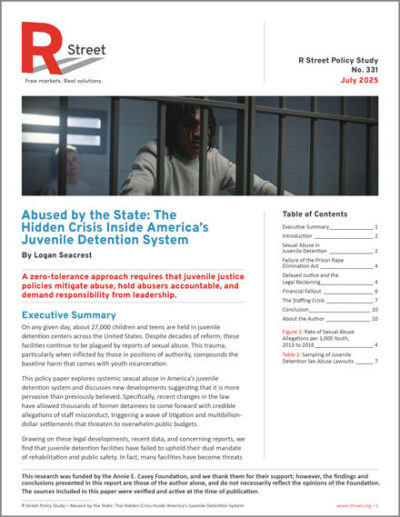Over 13,000 Allegations in 11 Years
From 2007 to 2018, facilities reported more than 13,000 allegations of sexual abuse, with 7,272 attributed to staff. The actual number is likely higher due to underreporting and fear of retaliation.

This report from the R Street Institute uncovers a harrowing national pattern: systemic sexual abuse within America’s juvenile detention facilities. Drawing from data submitted under the Prison Rape Elimination Act (PREA) and verified by the Bureau of Justice Statistics (BJS), the study documents more than 13,000 allegations of sexual victimization between 2007 and 2018. More than half of these alleged incidents involved facility staff as perpetrators.
Drawing on recent data, legal developments and alarming firsthand accounts, the report finds that juvenile detention facilities have failed to uphold their dual mandate of rehabilitation and public safety. Youth in confinement, often detained for nonviolent offenses, face isolation and retaliation when reporting abuse. Many survivors report threats, physical harm or solitary confinement in response to coming forward.
The report highlights deep gaps in accountability. Over 60% of facilities found claims to be unsubstantiated, often due to limited evidence or lack of follow-up. Even when substantiated, most staff perpetrators face no legal consequences. Institutional resistance, flawed oversight and a lack of transparency leave youth vulnerable and voiceless.
To address these failures, the report outlines an evidence-based policy roadmap: strengthen PREA enforcement, expand anonymous reporting channels, raise hiring and training standards, improve facility infrastructure and bolster independent oversight. These reforms should be paired with a strategic reduction in the overall use of secure detention — as the most effective safeguard against institutional abuse is to limit unnecessary incarceration in the first place.
This study paints a sobering picture of unchecked abuse in juvenile detention facilities, where systemic failures in oversight, enforcement and accountability leave children at risk. By exposing these patterns and shortcomings, the report urges policymakers, advocates and system leaders to prioritize reforms that safeguard youth and dismantle the cultures of silence within confinement systems. The author offers 10 evidence-based, actionable solutions that form a blueprint for a zero-tolerance approach to sexual abuse in juvenile detention facilities.
We hope you'll find value in this report. We’d love to get a little information from you, which we'll use to notify you about relevant new resources.